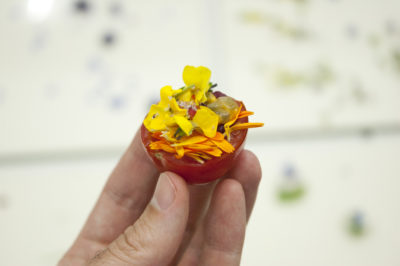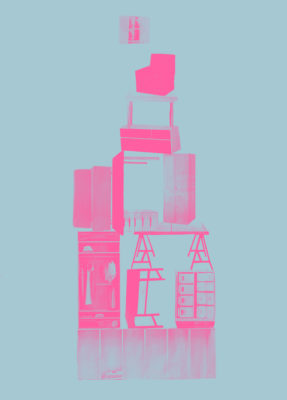Marisa Benjamim
Marisa Bemjamim erweitert den Ausstellungsraum der Galerie Wedding und verwandelt die sonst nicht öffentliche Galerieküche in Bemjamim’s Kitchen – eine Rauminstallation aus Garten, Erinnerungsort und Blütenlabor. Ihre mehrjährige Erforschung und künstlerische Auseinandersetzung mit fallenden Blättern (Zeichnung) und essbaren Blumen und Blüten (Performance), ihrer Geschichte, Darstellung und Verwendung sowie der Küche als sozialem Raum stehen im Fokus der Arbeit Künstlerin. In den gewächshausartigen Bedingungen vor Ort findet sie ein geeignetes temporäres Zuhause für ihre Pflanzen, deren kulinarische Zubereitung einen wichtigen Teil ihrer künstlerischen Praxis darstellt. Als performatives Einzugsgeschenk lädt sie daher während der Eröffnung zum Verkosten ihres Edible Herbarium ein.
english Version:
Benjamim’s Kitchen. Marisa Benjamim expands the exhibition space of Galerie Wedding by turning the usually restricted back room/the gallery kitchen into Benjamim’s Kitchen – a spatial installation that is a garden, a site of memory and a petal laboratory. Her longterm exploration and artistic interest in falling leaves (in drawings) and edible flowers and petals (in performances), her history, its depiction and use as well as the kitchen as a social space represent the focus of the artist’s work. The architecture of the gallery is reminiscent of a greenhouse and offers a suitable temporary home for her plants. Their culinary preparation is an important part of Bemjamim’s artistic practice. As a performative house warming present she thus invites to a tasting of her Edible Herbarium at the opening of the exhibition.
Biografie/ Biography
Marisa Benjamim
Webseite der Künstlerin/ Website of the artist
http://marisabenjamim.com/
Marisa Benjamim's Floristaurant (c) Andrés Galeano, 2016

Workshop by Marisa Benjamim Edible Herbarium. Foto: Andrés Galeano 2016

Marisa Bemjamim »For the past six years, I have been exploring the relationship of contemporary humanity and nature with an approach that is comprehensive, anthropocentric and ecological. The conception of nature in modernity has important implications for the structures and processes of social life. The discourse of modernity, combined with capitalism, has had a clear influence on the ways in which we conceptualise nature. I have undertaken an ongoing documentation and in-depth study of plants, flowers and food: Herbariums, edible flowers, and food archaeology.My focus is on the ubiquity of flowers and herbs as images and symbols in human societies throughout history (the role of nature in history and the history of images of nature, especially flowers). Our relationship to plants, our need to have them around us, how they have come to be a representation of »nature« in our own manufactured environments.«
Floristaurant von Marisa Benjamim. Foto: Andrés Galeano, 2016

Marisa Benjamim »Edible Herbarium«, ©Andrès Galeano
















